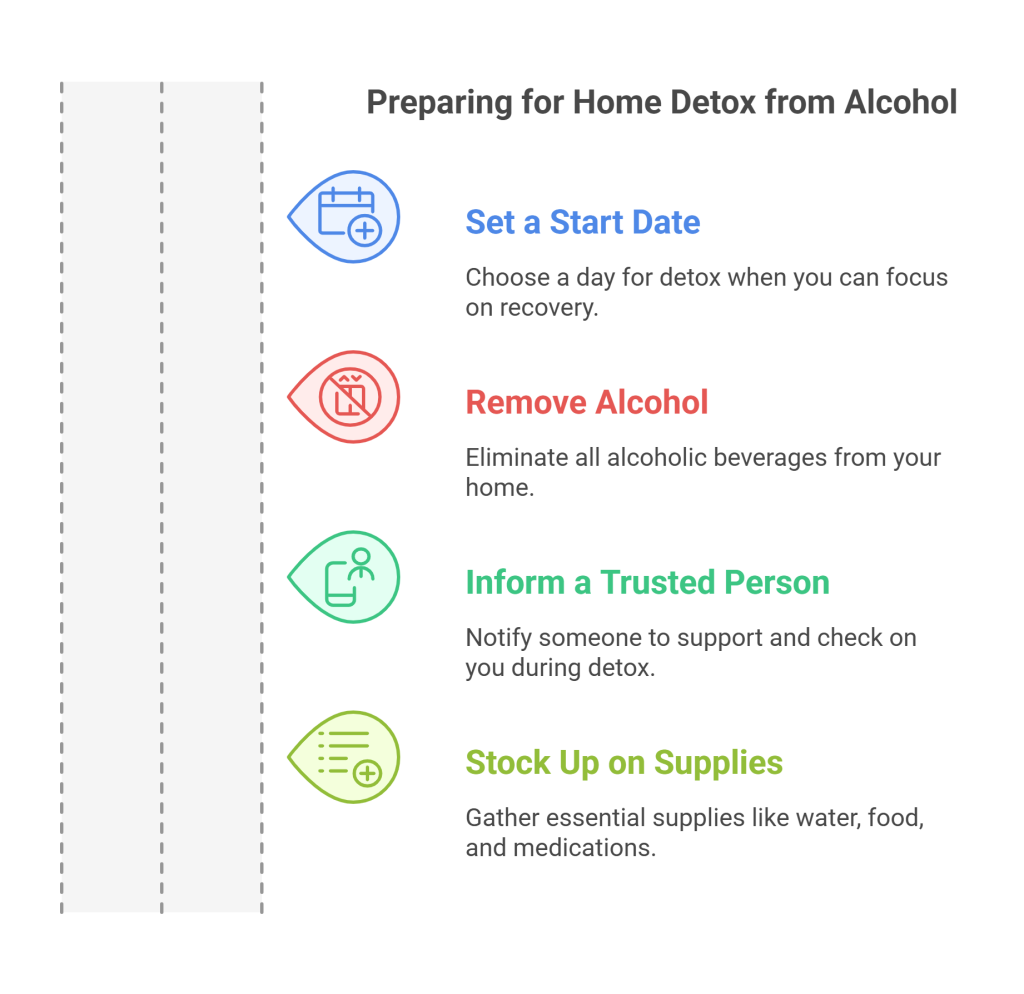How Home Detox Works: A Step-by-Step Guide to Safe Alcohol Detox at Home
Introduction
Deciding to detox from alcohol is a big step toward regaining control over your life and health. For some individuals, home detox may be a suitable option, offering privacy, comfort, and flexibility. However, detoxing at home requires careful planning, knowledge, and support to ensure a safe and effective process.
This guide will walk you through how home detox works, the necessary precautions to take, and steps to ensure a successful recovery.
What is Home Detox?
Home detox is the process of quitting alcohol and allowing the body to eliminate toxins without being admitted to a hospital or rehab facility. It is an alternative for individuals with mild to moderate alcohol dependence who do not require intensive medical supervision.
Who Can Detox at Home?
Home detox may be appropriate for people who:
✅ Have a mild to moderate alcohol dependency.
✅ Are not experiencing severe withdrawal symptoms (such as seizures or hallucinations).
✅ Have a strong support system (family or friends to assist them).
✅ Have no history of delirium tremens (DTs) or medical complications.
✅ Are fully committed to staying sober.
Who Should NOT Detox at Home?
Home detox is not recommended for individuals who:
❌ Have a history of severe alcohol withdrawal (seizures, DTs, or severe confusion).
❌ Are long-term heavy drinkers who consume large amounts of alcohol daily.
❌ Have serious medical conditions (heart disease, diabetes, liver disease, etc.).
❌ Do not have a safe and supportive environment.
❌ Have a history of relapse or unsuccessful detox attempts.
If you fall into the high-risk category, medically supervised detox is the safest option.
1. Preparing for Detox
Detoxing from alcohol at home requires proper preparation. This step will help reduce discomfort and increase your chances of success.
✅ Set a Start Date
- Choose a day when you can rest and focus solely on recovery.
- Avoid high-stress situations or commitments during detox.
✅ Remove Alcohol from Your Home
- Get rid of all alcoholic beverages to eliminate temptation.
- Avoid social situations where alcohol is present.
✅ Inform a Trusted Friend or Family Member
- Let someone know about your detox plan so they can check in on you.
- If possible, have someone stay with you in case of emergency.
✅ Stock Up on Essential Supplies
You’ll need:
✔ Water and electrolyte drinks (to prevent dehydration)
✔ Healthy, easy-to-digest foods (bananas, soup, whole grains)
✔ Vitamins and supplements (B-complex, magnesium, and zinc)
✔ Over-the-counter medications (pain relievers, nausea relief)

2. Managing Withdrawal Symptoms
Alcohol withdrawal symptoms can range from mild to severe. Understanding what to expect can help you manage them better.
Common Withdrawal Symptoms
- Anxiety, irritability, or mood swings
- Nausea, vomiting, and loss of appetite
- Sweating and tremors
- Insomnia or disturbed sleep patterns
- Fatigue and headaches
How to Ease Withdrawal Symptoms at Home
✅ Stay Hydrated – Drink plenty of water, herbal teas, and electrolyte drinks to prevent dehydration.
✅ Eat Nutrient-Dense Foods – Focus on light, healthy meals like fruits, vegetables, and lean proteins.
✅ Take Supplements – Alcohol depletes essential nutrients, so taking B vitamins, magnesium, and zinc can aid recovery.
✅ Get Plenty of Rest – Allow your body time to heal by sleeping as much as needed.
✅ Practice Relaxation Techniques – Deep breathing, meditation, or listening to soothing music can reduce anxiety and stress.
Symptoms That Require Medical Attention
Seek immediate medical help if you experience:
⚠️ Severe confusion or hallucinations
⚠️ Seizures or convulsions
⚠️ High fever and excessive sweating
⚠️ Severe vomiting and dehydration
⚠️ Uncontrollable shaking
These could be signs of Delirium Tremens (DTs), a life-threatening withdrawal condition that requires emergency care.
3. Staying Committed and Avoiding Relapse
Once you’ve detoxed, the journey to long-term sobriety begins. Here’s how to stay on track:
✅ Join a Support Group
- Consider groups like Alcoholics Anonymous (AA) or SMART Recovery for peer support and accountability.
- Having a sober network can greatly reduce the chances of relapse.
✅ Seek Therapy or Counseling
- Cognitive Behavioral Therapy (CBT) can help address underlying emotional triggers.
- Individual or group therapy provides guidance and motivation to stay sober.
✅ Adopt a Healthy Lifestyle
- Exercise regularly to reduce stress and improve mood.
- Eat a balanced diet to restore your body’s health.
- Practice mindfulness, yoga, or hobbies to fill the void alcohol once occupied.
✅ Identify and Avoid Triggers
- Stay away from people, places, or situations that encourage drinking.
- Have a plan in place for handling cravings (such as calling a friend or engaging in a distracting activity).
✅ Consider Medication-Assisted Treatment (MAT)
- In some cases, doctors may prescribe medications like Naltrexone, Acamprosate, or Disulfiram to help reduce cravings and prevent relapse.
Pros and Cons of Home Detox
| Pros | Cons |
|---|---|
| Detox in the comfort of your home | Withdrawal symptoms can be unpredictable |
| Lower cost compared to rehab or hospital detox | Medical complications may arise if not monitored properly |
| Privacy and flexibility | Lack of 24/7 medical support in case of emergency |
| Can be effective for mild alcohol dependence | Higher risk of relapse without structured support |
If you’re unsure whether home detox is right for you, consult a doctor or addiction specialist for guidance.
Final Thoughts
Home detox can be a safe and effective way to quit alcohol for some people, but it requires careful planning, support, and a commitment to recovery. It’s important to listen to your body and seek medical help if withdrawal symptoms become severe.
Remember, detox is just the first step—maintaining sobriety requires ongoing support, lifestyle changes, and emotional healing.
If you or a loved one is struggling with alcohol dependence, you are not alone. There are many resources available to help you achieve and maintain a sober, healthy life.
For more guidance, professional support, or recovery resources, explore our website or reach out to a healthcare provider today. Your journey to recovery starts now.

